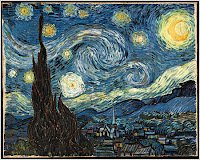Elsewhere, someone writes, pretty much:
My characters never develop beyond something used to fill a gap in the story or follow the plot as directed by the writer.
What goes on through your head when you create a character?
There are dozens of good ways to develop characters. You get thirty writers talking and you're going to hear thirty methods, most of them contradictory, some of them involving lists and interviews and diagrams and scrapbooks. Some of them mentioning alcohol.
The best way to create characters is to try a bunch of these methods with an open mind and then go along doing what works for your particular and idiosyncratic creativity.
When I suggest this stuff below, you are advised to take it with a grain of salt because it may not work for you. But here something to try:
Sit down where it's quiet and you don't have anything you need to do for a while. Get comfortable. Close your eyes. Think of your character in one particular scene, in one specific time and place.
This is a visualization exercise. You're going to crawl inside that character. You are going to see the world from his POV.
Try real hard not to feel silly, ok?
We enter the character by imagining what comes to his senses.
He or she is sitting, as you are. What's underneath him -- the stairs, a log beside the campfire, a velvet sofa? Is there wind? What do you smell in the air? What do you hear?
We enter our character by imaging the interior of his mind and body. He is filled with emotion and needs. Is he warm, cold, tired, hungry, excited, angry, annoyed, afraid?
Our guy has just finished doing something. What? He carries the immediate memory of those recent actions and feelings.
And we enter the character by imagining his needs.
Your character, at every moment, is just chock full of some goal.
What does he want, right now?
A sandwich? Directions to the zoo? A chance to kiss Molly? The combination to the safe? Escape from the toothed boomerslings?
What emotion does he feel in regard to that goal?
What action does he plan to get him what he wants?
This is how we create our people. We don't look down from on high as if they were chess pieces we're going to move around at our convenience. We get down in the mud with them. We gain our insights from sensing what goes on inside the skin. We find out how the characters see each other at eye level.
Because that's where we are. At eye level.
I don't mean to say we shouldn't set down a list of parameters for the characters.
In
Forbidden Rose, right from the start, I knew Justine had to be very young, no older than Adrian. She had to be intelligent and educated, of the nobility, a great and loyal French spy, more fond of guns than knives, and with a horrific past. I pictured someone of sorta midbrowny coloring, so she wouldn't match Adrian's darkness.
These are character parameters I needed for the long-term plot of
Forbidden Rose and
Black Hawk.
But see how none of this is
important stuff about her. None of it helps me know
who she is. Any kind of persona at all could fit inside those parameters.
I didn't know 'Justine' herself till one day I was writing along in the early imagining of the story and I closed my eyes and there she and I were, in her bedroom, with Severine and Adrian. It was one of the first scenes of the book I could visualize. That's when Justine began telling me about herself. And that's the first time I saw Severine and knew how I'd wrap up the story.
So this is what I'd advise.
Instead of laying down the law on what our folks have to do for plot reasons or what they have to be so they match some consistent and usable character we want them to be,
we let them tell us what they feel and think and need.
We learn this stuff because we are inside their skin.
Eventually, we can ask what they want, long term, and we can go back and look into their past to discover why they want it.

















































